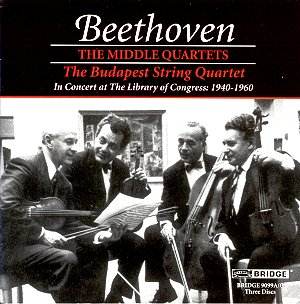Admirers of the Budapest String Quartet have recently
had cause to celebrate their good fortune. A profusion of recordings,
archive and re-releases, have restored or added to a discography already
well documented. Bridge have released two three CD sets devoted to recitals
given by the Quartet at the Library of Congress during their residence
there which ran from 1940-62. Remastering has been judiciously applied,
albeit the rather boxy acoustic of the Coolidge Auditorium must have
proved initially somewhat unsympathetic.
It’s difficult to underestimate the ascent of the Budapest
Quartet in American musical life or their perceived supremacy over many
years. From 1930 until 1962 they performed approaching sixty cycles
of the Beethoven Quartets and made three studio recordings of them –
one on 78, one on mono in 1952 and one on stereo LPs in 1959. For The
Library of Congress they performed the cycle four times, from which
come the recordings enshrined in these discs. The bulk come from the
early to mid 1940s – though one of their most searching interpretations
Op 59 No 2, is heard here in a performance from April 1960, a year or
so after they made their last commercial recording of the cycle. With
so few sound problems – a small patch due to a damaged master is noted
in the Presto of Op 74 - we can concentrate more fully on the extra
quality of energy and immediacy generated by these live performances
and admire the many qualities that made the Budapest so eventful a foursome
– their sense of momentum, instrumental finesse, cohesive tonal palette
which tended to the rarefied, a certain objective, rather analytical
approach, though not one devoid of depth or powerful and lyrical currents
of feeling. The level of musicianship is exceptionally high here, intonation
excellent, and ensemble secure.
The traversal of Op 59 No 1 is of real stature, confident
and lively playing by Joseph Roismann, the leader, with an ebullient
Allegretto and powerful intensity and consonant sense of arching line
in the Adagio. The second CD features the only performance here with
Edgar Ortenberg as second violin. He replaced Alexander Schneider when
the latter resigned to join other chamber groups. Ortenberg was a fine
player with a notable recording of Hindemith’s Third Violin Sonata to
his credit but is generally held to be a "cooler" player than
the more extrovert Schneider. This performance was recorded over two
days, 6th and 7th March 1946 the sleeve note writer,
Harris Goldsmith, avers that this is a "bolder and less silken"
reading than the quartet’s other recordings – but to my ears though
I admire the narrative grip of the first movement, the questing nobility
of the Andante and the strongly declamatory tone they can impart I still
found parts of the Minuetto intolerably manicured and glib. Op 59 No
2 however – in striking and immediate 1960 sound – was a Budapest speciality
and first recorded by them in 1935, at a time when Istvan Ipolyi, the
sole surviving Hungarian member, was still with them. The recording
preserved here is from the last of the four Library of Congress Beethoven
cycles and convincingly demonstrates their consistently inspired way
with this music. The passionate and engaged performance is very slightly
tighter and tauter than the commercial recording of a year earlier but
with little loss of lyrical momentum. The Adagio from that 1959 cycle
is one of the most moving that I know and whilst this live performance
doesn’t quite match it, the Budapest have an extraordinary powerful
way with it.
Op 74 is a forceful and not at all avuncular affair
with its primus inter pares role for Roismann – who acquits himself
with distinction in an interpretation about which I am at best ambivalent.
It seems unyielding to me. Harris Goldsmith is an excellent guide through
the various recorded cycles, comparing and contrasting performance practice
and subtleties of interpretation. He is perhaps – understandably – overgenerous
to the quartet with regard to the 1940 Op 95 – in their subsequent December
1941 reading they were somewhat broader and less discursive, less prone
to impose manifold abrasions and disjunctions on the line – but this
was never one of their most winning interpretations.
In addition to the performances CD 1 boasts a six minute
spiced interview with Alexander Schneider from the late 1980s – charismatic
as ever. Altogether this is an invaluable addition to the important
discography of the Budapest Quartet in excellent sound, splendid documentation
and full of concentrated wisdom.
Jonathan Woolf


